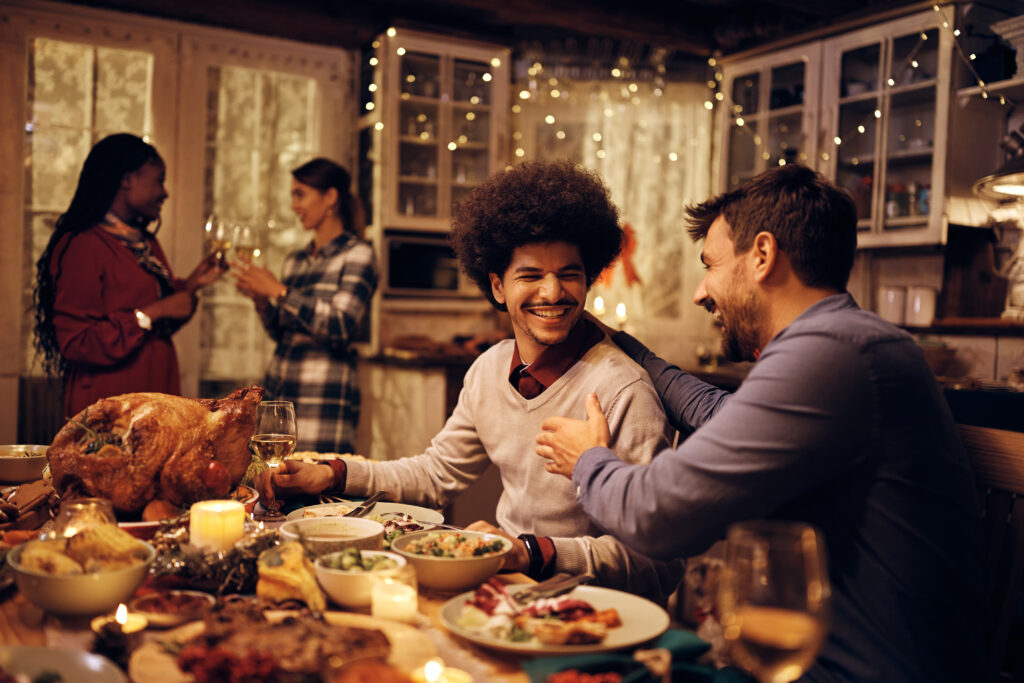As a therapist, I am acutely aware of the negative impact the holiday season can have on mental health. For those experiencing seasonal depression, winter months are often when symptoms return full force; people struggling with grief, family conflict, and other types of loss, experience the holidays as a stark reminder of who is missing; and even those with bi-polar disorder in a manic episode may find the holidays hard to navigate thanks to holiday sales encouraging impulsive spending. In short, this time of year can be anything but magical for many people.
It is with this challenge in mind that I want to reflect on the power of my favorite holiday – Thanksgiving. One of the few holidays in the year not yet completely overrun by consumerism and obligation. While extravagant feasts and dinner hosting can be challenging and overwhelming, as can visiting family/friends during such a stressful time of year, it seems that for many people there are fewer expected high-pressure, wallet-emptying traditions surrounding Thanksgiving than just about any other holiday observed in our society. In short, Thanksgiving has, through so much stress and turmoil, still managed to remain a holiday whose driving forces are positive reflection and appreciation. It is a holiday which has the power to become a remembrance day to honor all the good – however big or small – that has happened in our lives over the past year and beyond.
Please don’t misunderstand me. Reminiscing on the positives isn’t always easy, especially for people experiencing mental health symptoms. Quite often, when someone with a mental health struggle is encouraged to reflect on the positive, their brain wants to say “what’s the point? Everything is so negative anyway.” They resist because that’s all their brain has allowed them to do for a very long time. It takes self-awareness, commitment to making a change in one’s perception, and dedication to altering one’s own internal dialogue for someone to succeed in genuinely experiencing a shift towards appreciative thinking.
With such practice, however, their higher self can learn to respond to that aforementioned cognitive resistance with “the point is that we spend so much of our energy in this society focusing on the negative and what has gone wrong that a respite into the realm of positive is both necessary and well-deserved.” This is the very foundation of cognitive restructuring – the skill to recognize “self-defeating beliefs or cognitive distortions, refute them, and then modify them so that they are adaptive and reasonable” (APA Dictionary of Psychology). And when you apply this approach to an entire day dedicated to gratitude that multiple people within a society celebrate, and combine it with the brain’s affinity for group-think, then it becomes all the easier for the brain to buy into the idea that the effort to explore the positive is worthwhile. This effort can then become a ripple effect that encourages others to get in touch with their own gratitude and positive regard for life. Meaning that one act of cognitive restructuring to embrace optimism can lead to another and another, building upon itself until the act of gratitude becomes its own self-sustaining system allowing a mentally ill brain an ever-easier path towards embracing a healthier way of thinking and reflecting. A simpler way of putting this is to say that humans are beings who reflect what is around us – both behaviorally and cognitively. So, when the people we love and respect model a way of thinking which tunes into events that have been beneficial and appreciated, then we are more like likely to adopt this way of thinking ourselves.
Thankfully, Thanksgiving remains at its heart a day which encourages us all to pay homage to the events and people which have served us well. It is a holiday whose main expectation is that people practice challenging their negative cognitive distortions about how broken their life or our society are, and instead tune into that which we wish to build upon and strengthen. I love Thanksgiving because it is a day that naturally facilitates subconscious mental health improvement with minimal economic or social obligations attached. So, as this Thanksgiving approaches, my hope is that you are able to lean into the social encouragement of reminiscing over all the good and positive things you’ve experienced over this past year, and that doing so brings you relief from any darkness harboring within.
